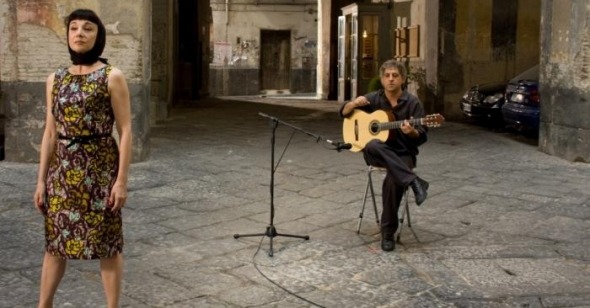L’Avventura
By Fernando F. Croce
Passione
Dir: John Turturro, U.S./Italy, Squeezed Heart Productions
When one thinks of John Turturro’s films as a writer-director, the distinctive aspect that might spring to mind is not visual but sonic, a screen that vibrates less with strong images than with powerful aural groupings and collisions. Irrepressible, choleric, always theatricalizing themselves, the characters of Mac and Illuminata seem forever on the verge of breaking into tragicomic arias, a feeling made audaciously literal in the Demy-via-Cassavetes singalong bouts of his 2005 film Romance & Cigarettes. Lyricism and truculence run side by side in these studies of la voix humaine, and never more so than in Romance’s tuneful-dissonant set pieces, which flirt with experimentalism as the heightened emotions of blue-collar palookas and yentas find ungainly yet impassioned expression in tunes by Engelbert Humperdinck and Janis Joplin. Passione, Turturro’s fourth directorial effort and first documentary, doesn’t have the stylistic daring of that previous film (or of Pedro Costa’s Ne change rien or Miguel Gomes’s Our Beloved Month of August, last year’s two great musicals), yet its portrait of a city trembling with voices past and present feels every bit as much of a labor of love.
The city is Naples, the southern Italian “hot spot” which, as Turturro puts it during his intermittent appearances as our onscreen guide, has had its share of natural and historical struggles (including Mount Vesuvius’ volcanic eruptions and occupations ranging from Normans to Americans), yet, “despite all, its people are still singing.” His goal is immersive but not touristic, he assures us, a concern already evident in “Era di Maggio,” the first of the film’s 23 musical vignettes: As fado singer MĂsia and art-pop band Avion Travel harmonize their auras of romantic sorrow in the center of a deserted courtyard, the slowly circling camera takes note of the corroded and graffiti-covered street walls surrounding them. Its architecture battered but unbowed, Naples here wears its scars as proudly as it does the various cultural threads (European, Middle Eastern, African, American) and performance styles (traditional opera, reggae, jazz, hip-hop) that come together to give Neapolitan music its flavor. It’s no coincidence that two of the film’s most memorable performers—M’Barka Ben Taleb, whose cool gorgeousness contrasts with her raspy voice as alluringly as it did with fellow Tunisian-born beauty Claudia Cardinale, and veteran saxophonist James Senese, the son of a local girl and an African-American soldier whose performance of the eponymous number is a bluesy highlight—testify to the melting-pot side of this communal jukebox.
Alternating between al fresco shoots and recording-studio sessions, Passione aims for a wide range of Neapolitan life and history. Vintage crooner Sergio Bruni and tempestuous chanteuse Angela Luce materialize in footage from the fifties and sixties to illustrate the city’s rich melodic past, a past that’s extended even further as three elderly locals argue over whether Enrico Caruso or Fernando de Lucia was the greatest fin-de-siècle tenor. The legendary comic Totò is represented in the “Malafemmena” number, a lightweight critique of machismo peculiarly filled with seventies-style zooms, while “Don Raffaè” rings the sole political note with its view of an imprisoned Mafia capo blithely ordering macchiatos from a baronial cell. Though the slowed-down impressionism of “Canto delle Lavandaie del Vomero” suggests a visual affinity with the bathing sirens sequence from the Coen Brothers’ O Brother, Where Art Thou?, Turturro’s staging of a good deal of the episodes comes off as prosaic, buoyed more by feistiness than by any sense of choreography. Numbers like “Nun te Scurdà ” and “Tammurriata Nera” aren’t hurt because they’re set purely as showcases for strong performers, but the choppy approach makes a sung skit like “Caravan Petrol” (which finds the filmmaker bouncing and strutting along with comedian-singer Fiorello) indistinguishable from a decades-old MTV music video.
Still, if Passione doesn’t have the polish of Carlos Saura’s meditations on dance and history, this self-described “musical adventure” proves to be no less personal to its maker. Cinematic views of Naples have run the gamut from Vittorio De Sica’s affectionate cultural burlesque in Marriage Italian Style to Francesco Rosi’s withering inquiries into poverty and corruption in Hands Over the City, to say nothing of Matteo Garrone’s depiction of the city as a multifaceted criminal grid in Gomorrah. Yet for Turturro, whose family is originally from Sicily and who signs the film with his Italian nickname (“Giuà ”), the influence that appears to loom largest is, surprisingly, John Ford’s The Quiet Man. As in Ford’s enchanted ode to the Irish countryside, its people and traditions, there’s the feeling of an auteur simultaneously journeying to his homeland and weaving a deeply felt fantasy, combining the reality of the land with the dreams he’s had about it—when Ford surrogate John Wayne gazes at the country’s impossibly lush fields and asks, “Is that real?” he could be Turturro himself blissfully contemplating Naples’ streets and faces and sounds. Whether celebrating the city’s rawness or accentuating its artifice, the film stands and stirs as a tribute to its abundant sensory pleasures.
